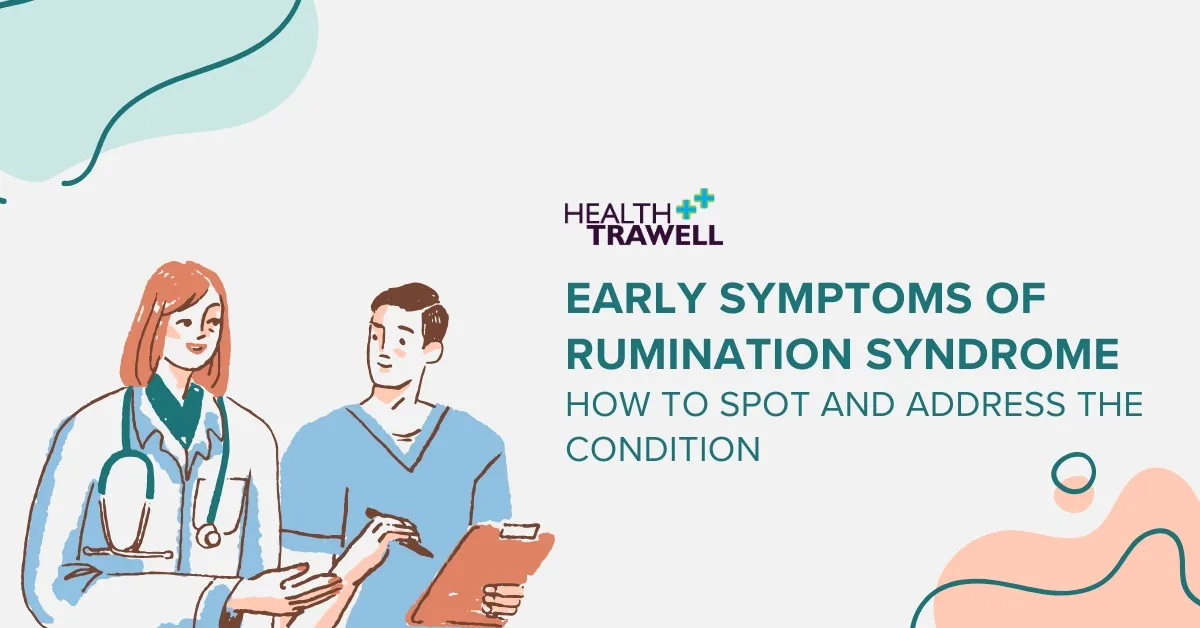Early Symptoms of Rumination Syndrome: How to Spot and Address the Condition

A Statistical Look at the Impact of Rumination Syndrome
Rumination syndrome is a usually mistook & under-recognised gastrointestinal disorder. In Abu Dhabi, UAE, awareness of rumination syndrome as a health concern remains low, with studies published in Gastroenterology Health Journal (Year 2023) showing that only around thirty percent of individuals with symptoms actively seek medical consultation. Such lack of knowledge delays diagnosis & treatment for people suffering from the discomfort & social challenges that are associated with this disorder.
What is Rumination Syndrome?
Rumination syndrome happens to be a chronic disorder where food that has been swallowed is regurgitated back up, either completely or partially undigested, into the mouth. Such phenomenon is not a result of vomiting or a typical eating disorder but is because of involuntary muscle contractions in the abdominal area. Automatic regurgitation of partially or fully undigested food usually occurs within a few minutes of eating & is not accompanied by the feeling of nausea, which typically precedes vomiting. Unlike some gastrointestinal issues, rumination syndrome is purely mechanical, means it is a learned behaviour rather than a reflex or reaction.
Symptoms of Rumination Syndrome
Understanding the symptoms of rumination syndrome can be crucial for early diagnosis & management. These symptoms can cause emotional & social stress, as individuals may feel self-conscious about eating around others. Unlike vomiting, rumination syndrome doesn’t involve retching, & food brought back to the mouth is often not sour, as it has not reached the stomach. Common symptoms tend to include the following:
- Regurgitation of undigested food shortly after eating, which may happen with every meal.
- An absence of the feeling of nausea before regurgitation.
- Pain or some kind of discomfort in the upper abdomen region.
- Weight loss because of food restriction or avoidance of eating to prevent regurgitation episodes.
- Bad breath or an acidic taste in the mouth because of frequent regurgitation.
- A possible feeling of discomfort or bloating, though this is not a very common symptom.
Regurgitation: The Core Symptom
Regurgitation is one of the defining features of rumination syndrome. It is usually the most troublesome. In people with such a syndrome, regurgitation happens automatically, without the conscious action usually associated with vomiting. This automatic regurgitation happens because of learned behaviours in the abdominal muscles & diaphragm. While it can usually resemble the symptoms of other eating disorders or gastrointestinal disorders, rumination syndrome stands apart because of its unique mechanism & absence of nausea or retching.
Rumination Syndrome as an eating disorder
While rumination syndrome is classified as a gastrointestinal disorder, it shares characteristics with eating disorders such as binge-eating or bulimia nervosa, where food regurgitation is also one of the symptoms. However, it is significant to understand that rumination syndrome differs from these eating disorders in several ways. Unlike bulimia, where vomiting is intentional, the regurgitation in rumination syndrome is automatic & doesn’t involve any desire to control weight. It is crucial that patients with rumination syndrome receive an accurate diagnosis & don’t assume their symptoms are psychological or an intentional eating disorder behaviour.
The Mechanism Behind Automatic Regurgitation
One of the hallmark features of rumination syndrome is automatic regurgitation. After food is swallowed, involuntary muscle contractions in the abdomen & diaphragm push food back into the oesophagus, and it is then regurgitated back into the mouth. The process is subconscious, which means that people with rumination syndrome have little control over this phenomenon. Such contractions become an ingrained behaviour, usually developing because of an underlying habit or response to anxiety & stress during meals.
The Impact of Undigested Food
In rumination syndrome, food is regurgitated shortly after being swallowed, and it has often not reached the stomach. This undigested food returns to the mouth in a recognisable form, different from what is seen in typical vomiting episodes. The return of undigested food can also result in malnutrition & discomfort if the condition is severe & long-lasting, as the body loses the chance to absorb essential nutrients.
Rumination Syndrome & Gastrointestinal Disorder
As a gastrointestinal disorder, rumination syndrome tends to be distinct, but it can usually be confused with other conditions such as GERD (gastroesophageal reflux disease). Unlike GERD, however, rumination syndrome is purely mechanical, and the regurgitation happens without acidic content, or the burning sensation, which is commonly associated with acid reflux. The underlying cause is because of automatic regurgitation triggered by muscle contractions rather than the digestive process itself. Such a disorder tends to affect people of all ages but is specifically prominent in individuals under stress or anxiety.
Causes of Rumination Syndrome
The causes of rumination syndrome are not entirely understood, but the disorder is thought to be a learned behaviour, which involves the voluntary control of abdominal muscles. It may start as a reaction to stress, anxiety, or discomfort during meals. In children, it is sometimes associated with developmental delays or issues with feeding behaviours. In adults, stress & lifestyle factors usually tend to play a role. Other potential causes of rumination syndrome include certain neurological & psychological factors, though more research is needed to pinpoint specific triggers.
Treatment for Rumination Syndrome
Treatment for rumination syndrome generally involves behavioural therapies, dietary changes, & sometimes medicines. The goal of treatment for rumination syndrome is to help patients manage symptoms & regain control over their eating patterns. Key treatment approaches include the following:
- Behavioural Therapy: Techniques like diaphragmatic breathing (deep belly breathing) help to prevent abdominal muscles from contracting involuntarily. With consistent practice, this method can greatly reduce automatic regurgitation episodes.
- Dietary Adjustments: Smaller, more frequent meals can sometimes reduce symptoms. Avoiding certain foods, which are difficult to digest, might also help minimize regurgitation episodes.
- Medication: While there are no specific medicines to treat rumination syndrome, certain drugs can be prescribed to address symptoms or accompanying gastrointestinal disorders.
- Biofeedback: Such a technique tends to involve monitoring bodily functions to help people become more aware of their muscle activity & learn to control it. Biofeedback may be especially useful for those who struggle with automatic regurgitation.
Get This Condition Treated in India with Health Trawell as Your Companion Here
For those seeking treatment for rumination syndrome or any other such gastrointestinal disorder, India provides world-class healthcare facilities. Doctors here are known for their expertise & have advanced treatment options. With Health Trawell as your trusted associate in India, you can navigate the complexities of international medical travel with ease. We specialise in connecting international patients with leading hospitals & experienced medical professionals, ensuring high-quality care & personalised support throughout your treatment journey in our country. From arranging appointments to providing travel assistance & post-treatment follow-ups, Health Trawell makes your health journey in India smooth & hassle-free. Selecting Health Trawell means you gain a reliable companion dedicated to your well-being, helping you find the right medical solutions for managing & treating rumination syndrome with confidence.



